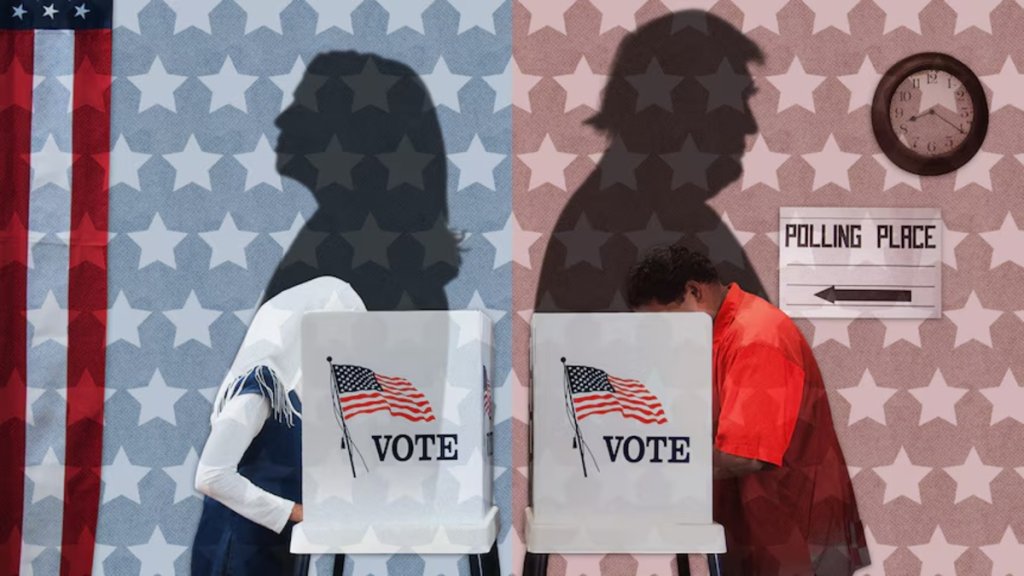As the 2024 U.S. presidential election draws near, the contest between Kamala Harris and Donald Trump is shaping up to be both complex and highly significant. Although Harris has built considerable momentum, her path to securing victory in the Electoral College remains uncertain. The Electoral College, a feature of the American political system, ensures that less-populated states maintain influence in national elections, preventing political dominance by densely populated coastal regions, which house about 40% of the U.S. population. This system allows a candidate to win the presidency without necessarily securing the majority of the popular vote. Despite the intended purpose of the Electoral College to protect the political interests of less-populated states, it has come under increasing scrutiny in recent years, most notably following the contentious 2000 election of George W. Bush and the 2016 election of Donald Trump. These elections have underscored its controversial role and ongoing debate surrounding its relevance in contemporary American politics.
The Importance of the Electoral College
The U.S. Electoral College requires a candidate to secure a majority of 270 out of 538 electoral votes to win the presidency. While Harris may receive overwhelming support in large states like California (54 electoral votes) and New York (28 electoral votes), the Electoral College system means that winning large states alone is not sufficient for a presidential victory. Smaller and more rural states, particularly in the Midwest and the Great Lakes regions, play a critical role in determining the outcome. As mentioned, this system ensures that the interests of voters in states like Wyoming, North Dakota, and Iowa are not overshadowed by the populous coastal regions.
The battleground state of Pennsylvania will likely play the decisive role in determining the outcome of this year’s presidential race. However, while winning Pennsylvania is necessary for both Harris and Trump, and holding the reliable electoral map constant, it alone will not be sufficient. From the list of swing states—those that have alternated between Republican and Democratic candidates—Harris in particular must also secure at least one additional state from the traditional “blue wall”, namely Michigan, to ensure a clear path to the White House. Without a victory in this key “blue-collar” state, where much of the population has historically worked in manual labor or skilled trades (hence, “blue wall”), her chances of winning the Electoral College will fall short.
National Enthusiasm for Harris but Challenges Ahead
At the beginning of her campaign, Harris gained a crucial surge of enthusiasm, particularly among anxious Democrat voters concerned about President Biden’s debate performance last June. Aware that media attention on his cognitive fitness could distract from key issues, Biden’s decision to step back from re-election hinged on securing the Democrat nomination for Harris. This unprecedented move by a sitting president not only energized his loyal supporters to rally behind the vice president but also inspired millions to contribute to her campaign, especially those excited about the prospect of electing a woman to the presidency. However, despite raising nearly $1 billion since her nomination, Harris’s momentum seems to have plateaued. Polls in Pennsylvania and Michigan remain within the margins of error, indicating that she has yet to make significant inroads in these critical states for an Electoral College victory.
Harris’ Pennsylvania Woes
Despite Pennsylvania having more registered Democrats than Republicans, the gap between the two parties has significantly narrowed over the past four years. In 2020, Democrats outnumbered Republicans by 666,202 voters, but as of October 21st of this year, that advantage has decreased by approximately 55%, leaving just 297,824 more Democrats than Republicans. The most notable shift, however, has been among Independents, who have increased by nearly 140,000 since the 2020 General Election.
In 2020, President Biden, who has roots in Pennsylvania, secured the state by just over 80,000 votes, making any shifts in voter registration particularly concerning for the Harris campaign. The sharp decline in registered Democrats over the past four years, combined with the significant Republican effort to register new voters, presents a formidable challenge. Republican outreach has successfully targeted various demographics, including blue-collar workers, the state’s growing Latino community, and even the Amish—an insular religious group known for rejecting modern technologies in favor of a simple, community-based lifestyle. This focus on expanding the Republican voter base poses a potential threat to Harris’s chances in the state.
For Harris to win Pennsylvania – and, frankly, Michigan – the race will largely hinge on four key factors: 1) she must secure the support of Independent voters, who now make up about one-third of the American electorate. Current polls suggest around 40% of Independents favor Harris, and if combined with strong Democratic turnout, this could swing the states in her favor; 2) Harris will need to appeal to the approximately 18% of Republicans who voted for Trump in 2020 but are not planning to support him in 2024. Winning over some of these disaffected Republicans could broaden her coalition; 3) a high voter turnout will be critical, as election data well-demonstrates that higher voter turnout is positively correlated with Democrat victories; 4) down-ballot races, particularly the Senate contest between incumbent Bob Casey (Democrat) and Dave McCormick (Republican), will have an impact. While Casey initially held a double-digit lead, recent polls show the race is now statistically tied, and the outcome could influence Democrats’ overall performance, including Harris’ chances.
An important voter group to target in both Pennsylvania and Michigan are Central and East European ethnic voters, particularly those of Polish and Ukrainian descent. Combined, these ethnic communities account for over 1 million people in each state. While many Poles trend conservative and traditionally lean Republican, given Trump’s recent comment that he would “encourage” Russia [Putin] to do “whatever the hell they want” to NATO allies, the Harris campaign recognizes the opportunity to mobilize these ethnic groups. By emphasizing the intertwined fates of Ukraine and Poland, Harris has framed the issue as not only a defense of Ukraine but also a safeguard for Poland and other former Soviet bloc countries. Mobilizing Central and East European-American voters with ties to their family’s historical experience during the dark period of Soviet occupation might give Harris the additional votes needed to defeat Trump in those states.
Election Outcomes and Transitions
As polls continue to narrow in Pennsylvania, despite the enthusiasm and momentum surrounding Harris’ campaign, the prospects of a second Trump presidency have increased in recent weeks. With less than two weeks left until election day, the evolving situation on the ground prompt two potential outcomes and their respective implication: one where Harris wins and another where Trump secures victory.
Potential Implication 1: The Threat of Election Chaos and Disruption in the United States if Harris Wins
Donald Trump and his surrogates, which include prominent figures like Elon Musk, have launched a campaign that preemptively casts doubt on the integrity of the election system, potentially eroding public trust in the results. Trump has repeatedly claimed that a Harris victory would only be possible through fraud, and in some of his speeches, he has ominously warned of a “bloodbath” if he loses. This inflammatory rhetoric raises serious concerns about the potential for civil unrest in the United States if Harris is declared the winner.
In addition to Trump’s comments, Elon Musk recently made false accusations against Michigan’s Secretary of State, Jocelyn Benson, claiming her office – which is responsible for running the state’s elections – is manipulating voter rolls to sabotage the Trump campaign. While this narrative has no basis in fact, it mirrors a broader strategy to undermine confidence in the electoral process, one that has also gained traction in Georgia. There, the state’s openly pro-Trump electoral board attempted to introduce new voting rules just weeks before early voting was set to begin. Though Georgia’s courts blocked these changes, the groundwork for a stolen-election narrative has already been laid. These efforts aim to generate confusion and potential delays, setting the stage for a constitutional crisis in the United States if the certification of votes is postponed, whether at the state level or in the U.S. Congress.
Potential Implication 2: Global Impacts of a Trump Victory
The global ramifications of another Trump presidency would be profound, particularly in a scenario where Republicans control the House of Representatives, the Senate, the Presidency, and the courts. In the United States, the courts, whose independence from the executive branch has seen a significant decline in public opinion and trust, are designed to serve as a critical safeguard for liberal democracy. Their fundamental roles are to protect the constitutional rights of citizens and determine the elasticity of power for both the presidency and Congress within the spirit of the American constitution. With the erosion of critical checks on the executive, Trump will have near carte blanche in shaping American foreign policy. His policies and worldview have consistently shown an affinity for authoritarian leaders, particularly Vladimir Putin, raising concerns about the future of global democratic institutions. A second Trump presidency will likely result in a weaker NATO and fundamentally shift Transatlantic relations at a time when far-right parties in Europe have risen to levels of relevancy not seen since the 1930s. These inward-looking, nationalist and exclusionary parties, such as the National Rally (France), the Alternative for Germany, Fidesz (Hungary) and the Freedom Party of Austria, have shown to be somewhat sympathetic to Putin while hostile to the norms and values of the European Union. Based on their values and worldview, these parties already claim to have found an ally in a Trump-led United States, undermining the liberal democratic bond between the two continents that has been in place since World War II. These political ramifications of another Trump presidency will also most assuredly have significant global economic consequences, as leading economists have cautioned that his proposed economic policies will undermine the economic stability of the United States. For scholars of political science and international relations, such a scenario could signal both the economic and political decline of the American hegemon. This decline would extend well beyond U.S. borders, potentially igniting a hegemonic conflict and leading to a fundamental realignment of global power, possibly favoring authoritarian regimes over liberal democratic ones.
To conclude, the outcome of the 2024 U.S. presidential election will have profound implications not only for Americans but for the world at large. While Kamala Harris may win the popular vote, her victory in the Electoral College is uncertain. The stakes in swing states like Pennsylvania and Michigan are higher than ever, and Harris’ ability to mobilize voters and counter Trump’s efforts to sow distrust in the electoral process will determine the course of the election—and potentially the future of liberal democracy itself.
_______________________________________________________________________________________________

Dr. Nevena Trajkov is an Assistant Professor and Department Chair of Political Science at Jacksonville University. She holds a PhD in Political Science from Florida International University and MA degrees in Political Science and Business Administration. Her research predominantly focuses on dissatisfied groups, accommodations and consolidation in divided societies, and her work has been presented at numerous academic conferences including the American Political Science Association, the International Studies Association, the International Political Science Association, the Association for the Advancement of Slavic, East European and Eurasian Studies, the Canadian Political Science Association, among others. She is a regular political commentator and analysts for media outlets in the United States, South America, and Europe.
To cite this work: Nevena Trajkov, “‘The U.S. Presidential Election: Key Things to Know and Potential Implications”, Panorama Online, 28 October 2024.https://www.uikpanorama.com/blog/2024/10/28/us-elections-nt
Copyright@UIKPanorama All on-line and print rights reserved. Opinions expressed in works published by the Panorama belongs to the authors alone unless otherwise stated, and do not imply endorsement by the IRCT, Global Academy, or the Editors/Editorial Board of Panorama.



